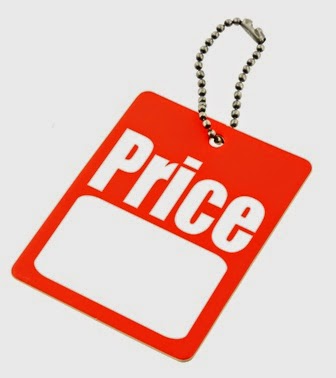What’s on the iPod: I’m Shakin’ by Jack White
I’m back again for the second installment of this month’s Writers Worth Month celebration. I promise you’ll hear from plenty of guest bloggers in the coming weeks. This week, short as it is, I wanted to talk price with you.
Imagine this scenario: You contact a writing client. You talk. He asks your rate. You provide it. He says, “Ooo, that’s too high.”
What’s the first thing that goes through your mind?
1) Oh damn, I just lost this client.
2) Oh gawd, what if he’s right?
3) My price is right; the problem is his budget.
4) Oh no! I should counter with “but it’s negotiable.”
If you answered 1, 2, or 4, congratulations. You’ve just allowed someone else’s reaction to influence your rate.
While you might mentally go for #1, it’s better to retrain your thinking. Putting the emphasis on losing the client means your emphasis isn’t on pricing your services appropriately. Instead, you’re thinking about how not to lose the client.
The best reaction is to understand where that client’s reaction is coming from. I’ve had plenty of experience with potential clients running when the price is mentioned. Sure, I could have lowered the rate and scored the gig, and a few times I did negotiate where I felt it was warranted on both sides of the equation. But for the most part, you should set your rates with confidence, and you should stick to them until you’re used to asserting your price without apology.
So why the reaction by clients? Well, many believe your price is some random number you’ve plucked out of the air. Frankly, at the start of your career, that may well be the case. However, if you’ve figured your rate (I love Jenn Mattern’s Freelance Hourly Rate Calculator), you know what it’s going to take to help you reach your business and personal goals.
Here are reasons why your price isn’t arbitrary:
1. Skill begets compensation. You may not command over $100/hour your first year in freelancing, but as your skills improve and you add more clips to your portfolio, you gain a higher market value.
2. Freelance is still cheaper than 9 to 5. The sticker shock many clients get when they realize you’re not charging the same as they’re paying employees can be a tough hurdle for you. However, a quick reminder to those clients that you’re actually charging less than they’d pay an employee in benefits may help. Even if you’re charging $125 an hour, you’re still a bargain to someone who pays an employee $65K to sit in the office every day.
3. You work smarter. I’ve seen plenty of corporate clients have meeting after meeting, pushing back decisions until everyone is on board, never really getting anything done. As a freelancer, you know how to work efficiently, listen, take charge where needed, and bring a unique perspective to the project.
4. You’re a business, not a hobbyist. Make no mistake – some clients will compare your rates to hobbyist writers who will work for free or practically free. That’s not you. You work for clients. Your job is your writing. You’re charging what’s fair, what the market already demands, and well within an acceptable range for the task at hand. You’ll be asked (if you haven’t been already) why your rates are ten, twenty, one hundred times that of other bidders. Your answer is simple — because this is your job, not your hobby.
Writers, what other reasons can you think of for why price is not arbitrary?
What advice can you give new writers on rates and negotiation?

Leave a Reply